- Home
- Christopher Moore
Sacre Bleu: A Comedy d'Art Page 2
Sacre Bleu: A Comedy d'Art Read online
Page 2
Lucien squeezed his sister’s shoulder as he passed. “Will you be all right?”
“Go, go, go,” she said.
Lucien brushed flour from his trousers as he made his way across the square to the edge of the Montmartre, where he looked out over Paris, shining in the noonday sun. Streams of black smoke from the factories in Saint-Denis to the east threw shadows over whole neighborhoods; the river Seine was a silver-blue blade bisecting the city. The boulevards shimmered with heat and activity and the acrid steam of horse piss. Butte Montmartre was above it all, the Mountain of the Martyrs, where St. Denis, Paris’s first bishop, was beheaded by the Romans in A.D. 251, and then, performing his final canonical miracle, picked up his severed head and carried it to the very spot where Lucien stood, and looking out over his city for the last time, thought, You know what would go good right there? A great, skeletal tower of iron. But then, I’ve lost my head. Ugh.
They say his head rolled all the way to what is now avenue de Clichy, and now Lucien set off down the two hundred and forty-two steps to that very same boulevard in the neighborhood around Place Pigalle, which was alive with cafés, brothels, cabarets, and on some mornings, the “parade of models” around the fountain in the square.
Lucien went first to Henri’s apartment at 21 rue de la Fontaine, where there was no answer. Thinking Henri might be passed out after another late night of absinthe and opium, Lucien asked the concierge to open the door, but alas, the painter was not there.
“I have not seen the little gentleman for two days, Monsieur Lessard,” said the concierge, a round, slope-shouldered woman with a bulbous nose and broken veins mapping her cheeks. “That one is out to bite the ass of the devil before he’s done.”
“If he comes in, please tell him I called,” said Lucien. He hoped Madame would not mention to Henri about biting the devil’s ass. It would inspire him, and not to art.
Then around the corner to the Moulin Rouge. The cabaret was not open to the public during the day, but sometimes Henri liked to sketch the dancers while they rehearsed. Not today; the dance hall was dark. Lucien asked after his friend at the restaurant Le Rat Mort, where the painter sometimes dined, and several of the cafés on avenue de Clichy before giving up and heading for the brothels. In the salon of the brothel on rue d’Amboise, a girl in a red negligee who had been dozing on a velvet divan when he came in said, “Oh yes, he has been here two days, maybe three, I don’t know. Is it dark out? One time he wants to fuck, the next he wants to draw you combing your hair, the next he is making you a cup of tea, and all the time with his absinthe or cognac—a girl needs a personal secretary to keep track of his moods. This work is not supposed to be complicated, monsieur. When I woke yesterday, he was painting my toenails.”
“Well, he is an excellent painter,” said Lucien, as if that might ease the girl’s anxiety. He glanced at her feet, but the whore wore black stockings. “I’m sure they are magnificent.”
“Yes, they were as pretty as a Chinese box, but he used oil paint. He told me I had to keep my feet in the air for three days while it dried. He offered to help. A rascal, that one is.”
“And where might I find him?” Lucien asked.
“He’s upstairs with Mireille. She’s his favorite because she’s the only one littler than him. Second or third door past the top of the stairs. I’m not sure, listen at the door. The two of them laugh like monkeys when they’re together. It’s unseemly.”
“Merci, mademoiselle,” said Lucien.
As promised, when he reached the third door from the top of the stairs, Lucien heard laughter punctuated by a woman’s rhythmic yipping.
Lucien knocked on the door. “Henri. It’s Lucien.”
From inside he heard a man’s voice: “Go away, I’m riding the green fairy.”
Then a woman’s voice, still laughing: “He is not!”
“I’m not? I’ve been lied to! Lucien, it appears that I’m riding the completely wrong imaginary creature. Madame, upon completion of my business, I will expect a full refund.”
“Henri, I have news.” Lucien didn’t think the death of a friend the kind of news one should shout through a whorehouse door.
“As soon as I have completed my—”
“Your business is completed,” giggled Mireille.
“Ah, so it is,” said Henri. “One moment, Lucien.”
The door flew open and Lucien jumped back against the railing, nearly tumbling over to the salon below.
“Bonjour!” said Count Henri-Marie-Raymond de Toulouse-Lautrec-Monfa, who was quite naked.
“You wear your pince-nez when you’re shagging?” said Lucien. Indeed, the pince-nez was perched on Henri’s nose, which abided at the level of Lucien’s sternum.
“I am an artist, monsieur, would you have me miss a moment of inspiration due to my poor eyesight?”
“And your hat?” Henri wore his bowler hat.
“It’s my favorite hat.”
“I will vouch for that,” said Mireille, naked but for her stockings, who slid from the bed and padded over to Henri, snatched the cheroot from his lips, then scampered away to the washbasin, puffing like a tiny marshmallow locomotive. “He loves that fucking hat.”
“Bonjour, mademoiselle,” said Lucien, remembering his manners even as he peeked around Toulouse-Lautrec’s shoulder to watch the prostitute washing herself at the bureau.
“Ah, lovely, is she not?” asked Henri, following Lucien’s gaze.
Lucien suddenly realized that he had stepped into the doorway and was now standing very close to his naked friend.
“Henri, would you put on some trousers, please!”
“Don’t shout at me, Lucien. You come here at the crack of dawn—”
“It’s noon.”
“At the crack of noon, and drag me away from my work—”
“My work,” said Mireille.
“Away from my research,” said Toulouse-Lautrec. “And then—”
“Vincent van Gogh is dead,” said Lucien.
“Oh.” Henri dropped the finger he had raised in the air to mark his point. “I had better put on some trousers, then.”
“Yes,” said Lucien. “That would be better. I’ll wait for you downstairs.”
He hadn’t meant to, but seeing the look on the painter’s face, Lucien realized that he had just done to Henri what the shopgirl had done to him: opened a trapdoor in the world through which Vincent had dropped.
LUCIEN WAS ANXIOUS WAITING AMONG THE WHORES. THERE WERE ONLY three in the salon at this time of day (when the house probably supported thirty in the evening), but they all sat together on one of the round divans, and he thought it would be rude not to sit near them.
“Bonjour,” he said as he sat down. The girl in the red negligee who had directed him was gone, perhaps entertaining a customer upstairs. These three were new to him, or at least he hoped they were new. Two were older than he, a bit time tattered, and each had hair dyed a different unnatural shade of red. The other was younger, but very round and blond, and looked somewhat clownish, with her hair tied up in a knot on the top of her head, lips large and red, painted into an unlikely pucker of surprise. None of the three looked capable of being surprised anymore.
“I’m waiting for my friend,” said Lucien.
“I know you,” said the round blond. “You’re Monsieur Lessard, the baker.”
“The painter,” Lucien said, correcting her. Damn it. Henri had brought him here two years ago when he was in the throes of an agonizing heartbreak, and although through the mystic haze of brandy, absinthe, opium, and despair Lucien could remember nothing, apparently he had made the acquaintance of this rotund girl-clown.
“Yes, painter,” said the blond. “But you make your living as a baker, right?”
“I sold two paintings just last month,” said Lucien.
“I sucked off two bankers just last night,” said the whore. “I’m a stockbroker now, no?”
One of the older whores elbowed the blond in the sh
oulder, then shook her head gravely.
“Sorry. You don’t want to talk about business. Did you ever get over that girl you were crying about? What was her name? Josephine? Jeanne? You kept wailing it all through the night.”
“Juliette,” said Lucien. What is Henri doing? He only had to get dressed, not paint the whole scene.
“That’s right, Juliette. Did you ever get over that slut?”
Another elbow, this one from the other whore, and to the ribs.
“Ouch. Bitch. I was just showing an interest.”
“I’m fine,” said Lucien. He was not fine. He was even less fine now that he thought he may have tried to find comfort on the body of this rough beast.
“Ladies,” called Toulouse-Lautrec from the staircase. “I see you have met my friend Monsieur Lucien Lessard, painter of Montmartre.” He was pacing off the steps with his walking stick, stopping on each step. Sometimes his legs hurt him more than others, like when he was coming off a binge.
“He was here before,” said round clown.
Henri must have seen the alarm on Lucien’s face, because he said, “Relax, my friend. You were entirely too drunk and sad to avail yourself of the ladies’ charms. You remain as pure and virginal as the day you were born.”
“I’m not—”
“Think nothing of it,” Henri said. “I remain your protector. Apologies for the delay, it appears that my shoes escaped during the night and I had to borrow a pair.” As he reached the foot of the stairs he lifted his trouser cuffs to reveal a pair of women’s high-button shoes, rather larger than one was used to seeing in a women’s style, for although Henri was short, only his legs were of small proportion, due to a boyhood injury (and his parents being first cousins); his other parts were man size.
“Those are my shoes,” said round blond.
“Ah, so they are. I’ve made an arrangement with the madame. Lucien, shall we go? I believe lunch is in order. I may have not eaten in days.” He tipped his hat to the whores. “Adieu, ladies. Adieu.”
Lucien joined his friend and they walked through the foyer and out the door into the bright sun, Henri a bit wobbly on the high heels.
“You know, Lucien, I find it very difficult to dislike a whore, but that blond, Cheesy Marie, she is called, has managed to provoke my displeasure.”
“Is that why you stole her shoes?”
“I did no such thing. A poor creature, trying to make her way—”
“I can see your own tucked in your waistband in the back, under your coat.”
“No they aren’t. That is my hunchback, an unfortunate consequence of my royal lineage.”
As they stepped off the curb to cross the street a shoe dropped out from under Henri’s coat and plopped on the cobblestones.
“Well, she was being unkind to you, Lucien. I will not stand for that. Buy me a drink and tell me what has happened to our poor Vincent.”
“You said you hadn’t eaten in days.”
“Well, buy me lunch then.”
“Did you ever get over that slut?” In Rat Mort—Henri Toulouse-Lautrec, 1899
THEY DINED IN THE WINDOW OF THE DEAD RAT AND WATCHED PASSERSBY IN gay summer apparel while Toulouse-Lautrec tried not to vomit again.
“Perhaps a cognac to settle your stomach,” said Lucien.
“An excellent idea. But I fear Cheesy Marie’s shoes are ruined.”
“C’est la vie,” said Lucien.
“I think Vincent’s passing has upset my constitution.”
“Understandably,” said Lucien. He thought he, too, might have converted his repast to a spectral roar, if he’d tried to layer his dismay over a dead friend on top of three days and nights of debauchery as had Henri. They had both attended Cormon’s studio with Vincent, painted alongside him, drank, laughed, and argued color theory with him in the cafés of Montmartre. Henri had once challenged a man who insulted Vincent’s work to a duel, and might have killed him had he not been too drunk to fight.
Lucien continued, “I was in Theo’s gallery just last week. Theo said that Vincent was painting like a fiend, that Auvers agreed with him and he was doing good work. Even Dr. Gachet pronounced him recovered from his breakdown in Arles.”
“I liked his ideas about color and use of the brush, but his emotions were always so high. Perhaps if he could have afforded to drink more.”
“I don’t think that would have helped him, Henri. But why, if he was doing good work, and Theo had his expenses covered—”
“A woman,” said Toulouse-Lautrec. “When a suitable time has passed, we should call on Theo at the gallery and look at Vincent’s last paintings. I’ll bet there is a woman. No man kills himself but it is for a broken heart; surely you know that.”
Lucien felt a pain in his chest for his own memories and in sympathy for what must have been Vincent’s suffering. Yes, he could understand. He sighed and, staring out the window, said, “You know, Renoir always used to say that they were all one woman, all the same. An ideal.”
“You are incapable of having a discussion without bringing up your childhood around the Impressionists, aren’t you?”
Lucien turned to his friend and grinned. “Like you are incapable of having one without mentioning that you were born a count and grew up in a castle.”
“We are all slaves to our histories. I am simply saying that if we scratch van Gogh’s history, you will find a woman was at the heart of his disease.”
Lucien shuddered, as if he could shake the memory and melancholy off the conversation the way a dog shakes off water. “Look, Henri, van Gogh was an ambitious painter, talented, but he was not a steady man. Did you ever paint with him? He ate the paint. I’m trying to get the color of a moulin right and I look over and he has half a tube of rose madder on his teeth.”
“Vincent did enjoy a fine red,” said Henri with a grin.
“Monsieur,” said Lucien. “You are a dreadful person.”
“I’m simply agreeing with you—”
Toulouse-Lautrec stopped and stood up, his gaze trained out the window, over Lucien’s shoulder.
“You remember when you warned me off of Carmen?” said Henri, putting his hand on Lucien’s shoulder. “No matter how I felt, letting her go, it was the best thing for me, you said.”
“What?” Lucien twisted in his chair to see what Henri was looking at and caught sight of a skirt—no, a woman, out on the street in a periwinkle dress, matching parasol and hat. A beautiful dark-haired woman with stunningly blue eyes.
“Let her go,” said Henri.
In an instant Lucien was out of his chair and running out the door.
“Juliette! Juliette!”
Toulouse-Lautrec watched as his friend ran to the woman, then paused in front of her, as if not knowing what to do. Her face lit up at the sight of him, then she dropped her parasol and threw her arms around his neck, nearly leaping into his arms as she kissed him.
The waiter, who had been drawn out of the kitchen when he heard the door, joined Henri by the window.
“Oh là là, your friend has captured himself a prize, monsieur.”
“And I fear it’s going to soon become very difficult being his friend.”
“Ah, perhaps he has some competition, eh?” The waiter pointed across the boulevard, where, straining to see around carriages and pedestrians, a small, twisted man in a brown suit and bowler hat was watching Lucien and the girl with a glint in his eye that looked to Henri like hunger.
Three
THE WRESTLING DOGS OF MONTMARTRE, PARIS
1873
“… A delicate thing in a white dress with puffy sleeves and great ultramarine bows all down its front and at the cuffs.” The Swing—Pierre-Auguste Renoir, 1876
LUCIEN LESSARD WAS TEN YEARS OLD WHEN HE WAS FIRST ENCHANTED BY the sacred blue. It was a minor enchantment, really, but even the storm that drowns an empire must begin with a single raindrop, and later, one might only remember a spot of moisture on the cheek and having the thought, Is that a bird?
“Is that a bird?” Lucien asked his father.
Père Lessard stood over the bread table in the back room of his bakery drawing patterns in the flour with a pastry brush, his forearms dusted white like great snowy hams.
“It’s a sailing ship,” said Père Lessard.
Lucien tilted his head this way and that. “Oh yes, now I see it.” He didn’t see it at all.
His father slouched, suddenly looking weary. “No you don’t. I’m no artist, Lucien. I am a baker. My father was a baker, and his father before him. Our family has fed the people of the butte for two hundred years. I have smelled of yeast and breathed the dust of flour my whole life. Not one day did our family or friends go hungry, even when there was war. Bread is my life, son, and before I die, I will have made a million loaves.”
“Yes, Papa,” said Lucien. He had seen his father slide into melancholy like this before, usually, like now, right before dawn when they were waiting for the first loaves to come out of the ovens. He patted his father’s arm, knowing that soon the bread would be ready and the bakery would boil with activity that would allow no time to grieve over ships that looked like birds.
“I would trade it all if I could lay down the colors of water like our friend Monet, or move paint like the joy in a young girl’s smile like Renoir. Do you know what I am talking about?”
“Yes, Papa,” Lucien said. He had no idea what his father was talking about.
“Is he going on about his pets again?” said Mother as she breezed into the room from the front, where she had been arranging the pastries in baskets. She was a stout, wide-bottomed woman who wore her chestnut hair up in a loose chignon that trailed tendrils that were either born of weariness or were simply attempting escape. Despite her size, she glided around the bakery as if dancing a waltz, her lips set in a bemused smile and a spark of annoyance in her eyes. Bemused and annoyed was more or less the lens through which Mère Lessard viewed the world. “Well, there are people waiting outside already, and it’s for the bread, not that paint stain you are raffling off.”

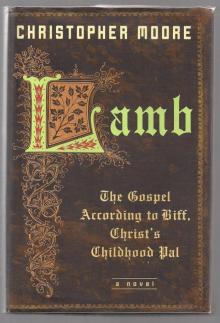 Lamb: The Gospel According to Biff, Christs Childhood Pal
Lamb: The Gospel According to Biff, Christs Childhood Pal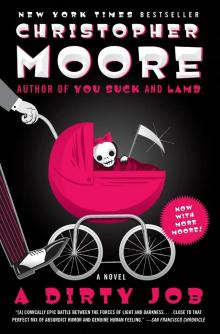 A Dirty Job
A Dirty Job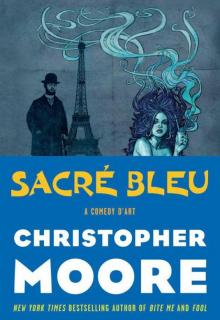 Sacré Bleu
Sacré Bleu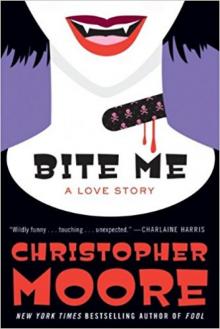 Bite Me: A Love Story
Bite Me: A Love Story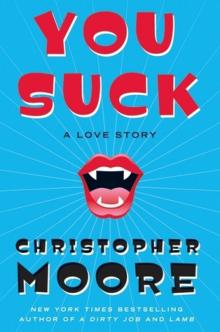 You Suck: A Love Story
You Suck: A Love Story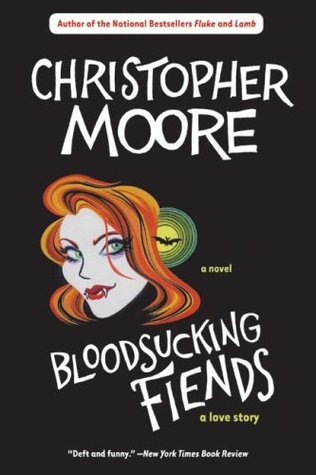 Bloodsucking Fiends: A Love Story
Bloodsucking Fiends: A Love Story The Stupidest Angel
The Stupidest Angel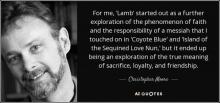 Coyote Blue
Coyote Blue The Lust Lizard of Melancholy Cove
The Lust Lizard of Melancholy Cove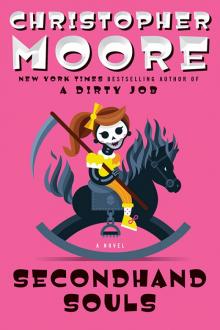 Secondhand Souls
Secondhand Souls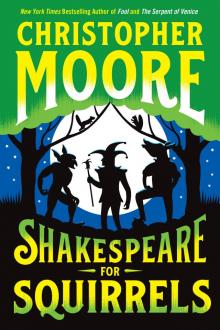 Shakespeare for Squirrels
Shakespeare for Squirrels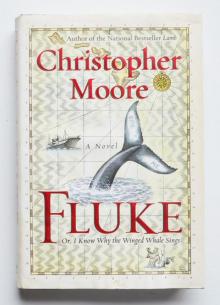 Fluke, or, I Know Why the Winged Whale Sings
Fluke, or, I Know Why the Winged Whale Sings Island of the Sequined Love Nun
Island of the Sequined Love Nun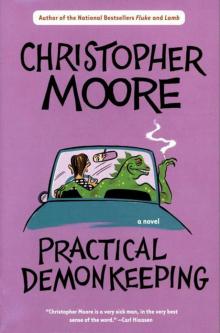 Practical Demonkeeping
Practical Demonkeeping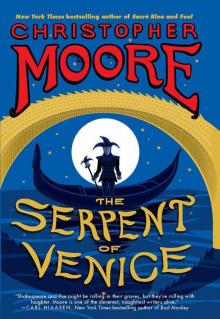 The Serpent of Venice
The Serpent of Venice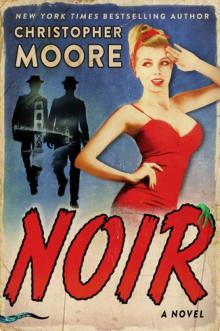 Noir
Noir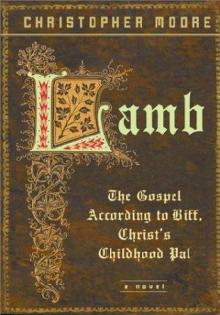 Lamb: The Gospel According to Biff, Christ’s Childhood Pal
Lamb: The Gospel According to Biff, Christ’s Childhood Pal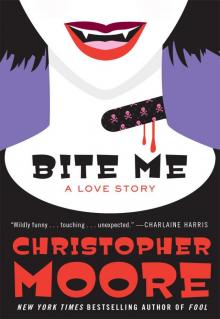 Bite Me
Bite Me Bloodsucking Fiends
Bloodsucking Fiends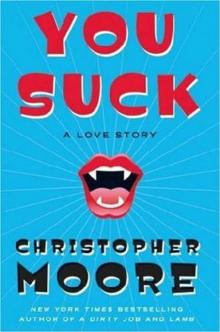 You Suck ls-2
You Suck ls-2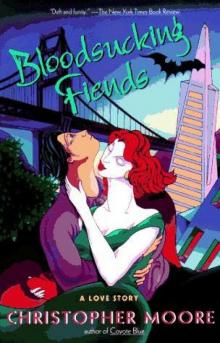 Bloodsucking Fiends ls-1
Bloodsucking Fiends ls-1 The Stupidest Angel: A Heartwarming Tale of Christmas Terror
The Stupidest Angel: A Heartwarming Tale of Christmas Terror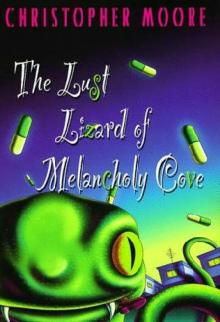 The Lust Lizard of Melancholy Cove pc-2
The Lust Lizard of Melancholy Cove pc-2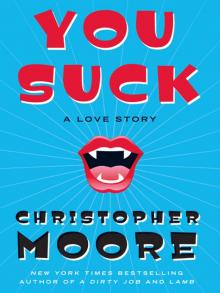 You Suck
You Suck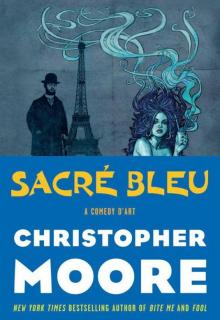 Sacre Bleu: A Comedy d'Art
Sacre Bleu: A Comedy d'Art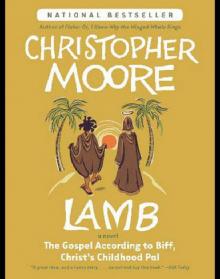 Lamb
Lamb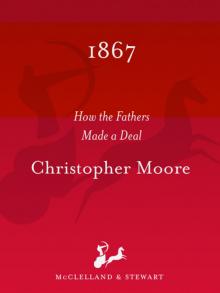 1867
1867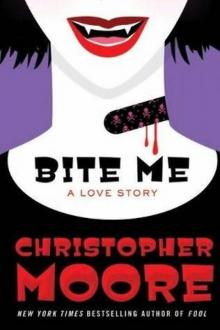 Bite Me ls-3
Bite Me ls-3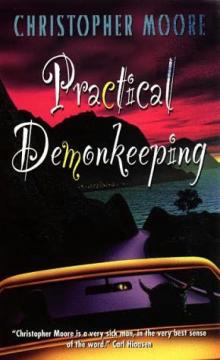 Practical Demonkeeping pc-1
Practical Demonkeeping pc-1